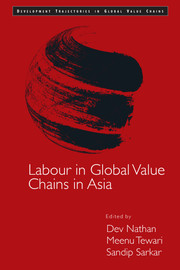Book contents
- Frontmatter
- Contents
- Figures
- Tables
- Foreword
- Preface
- Acknowledgements
- Introduction
- Captive Governance
- Modular Governance
- 11 From Disposable to Empowered: Rearticulating Labour in Sri Lankan Apparel Factories
- 12 Scripted Performances? Local Readings of ‘Global’ Health and Safety Standards in the Apparel Sector in Sri Lanka
- 13 Diffusing Labour Standards Down and Beyond the Value Chain: Lessons from the Mewat Experiment
- 14 Social Upgrading in Mobile Phone GVCs: Firm-level Comparisons of Working Conditions and Labour Rights
- 15 The Politics of Global Production: Apple, Foxconn and China's New Working Class
- 16 New Strategies of Industrial Organization and Labour in the Mobile Telecom Sector in India
- 17 Global Production Networks and Labour Process
- Relational Governance
- Conclusions
- Notes on Contributors
- Index
15 - The Politics of Global Production: Apple, Foxconn and China's New Working Class
from Modular Governance
Published online by Cambridge University Press: 23 July 2017
- Frontmatter
- Contents
- Figures
- Tables
- Foreword
- Preface
- Acknowledgements
- Introduction
- Captive Governance
- Modular Governance
- 11 From Disposable to Empowered: Rearticulating Labour in Sri Lankan Apparel Factories
- 12 Scripted Performances? Local Readings of ‘Global’ Health and Safety Standards in the Apparel Sector in Sri Lanka
- 13 Diffusing Labour Standards Down and Beyond the Value Chain: Lessons from the Mewat Experiment
- 14 Social Upgrading in Mobile Phone GVCs: Firm-level Comparisons of Working Conditions and Labour Rights
- 15 The Politics of Global Production: Apple, Foxconn and China's New Working Class
- 16 New Strategies of Industrial Organization and Labour in the Mobile Telecom Sector in India
- 17 Global Production Networks and Labour Process
- Relational Governance
- Conclusions
- Notes on Contributors
- Index
Summary
Introduction
The magnitude of Apple's commercial success is paralleled by, and based upon, the scale of production in its supply chain factories, the most important of them located in Asia (Apple, 2012a, p. 7). As the principal manufacturer of products and components for Apple, Taiwanese company Foxconn currently employs 1.4 million workers in China alone. Arguably, then, just as Apple has achieved a globally dominant position, described as ‘the world's most valuable brand’ (Brand Finance Global 500, 2013), so too have the fortunes of Foxconn been entwined with Apple's success, facilitating Foxconn's rise to become the world's largest electronics contractor (Dinges, 2010). This chapter explores the contradictions between capital and labour in the context of the global production chains of the consumer electronics industry. Drawing on concepts from the Global Commodity Chains and Global Value Chain frameworks (Gereffi and Korzeniewicz, 1994; Bair, 2005; Gereffi et al., 2005), the article analyses the power dynamics of the buyer-driven supply chain and the national terrains that mediate or even accentuate global pressures.
The principal focus is on labour in the electronics supply chain, including working conditions and labour as agency, consistent with recent studies of labour as the key element in global production chains or networks (McKay, 2006; Smith et al., 2006; Taylor and Bain, 2008; Webster et al., 2008; Taylor et al., 2013). In particular, the concentration of capital in China and the important roles played by Asian contractors open up new terrains of labour struggle (Silver, 2003; Appelbaum, 2008; Silver and Zhang, 2009). This inquiry evaluates the incentives for Apple to outsource and to concentrate production in a small number of final-assembly facilities in China. It also examines the potential risks or disincentives that might compel Apple to respond more directly, or responsibly, to negative publicity surrounding labour conditions and the collective actions of workers in its supply chain. While the specific detail is concerned with the interaction between Apple and Foxconn, the article briefly considers the relationship between other buyers (e.g., Dell) and contractors (e.g., Pegatron). Consequently, it locates emergent labour struggles more broadly in the electronics sector as a whole.
- Type
- Chapter
- Information
- Labour in Global Value Chains in Asia , pp. 353 - 376Publisher: Cambridge University PressPrint publication year: 2016
- 4
- Cited by

